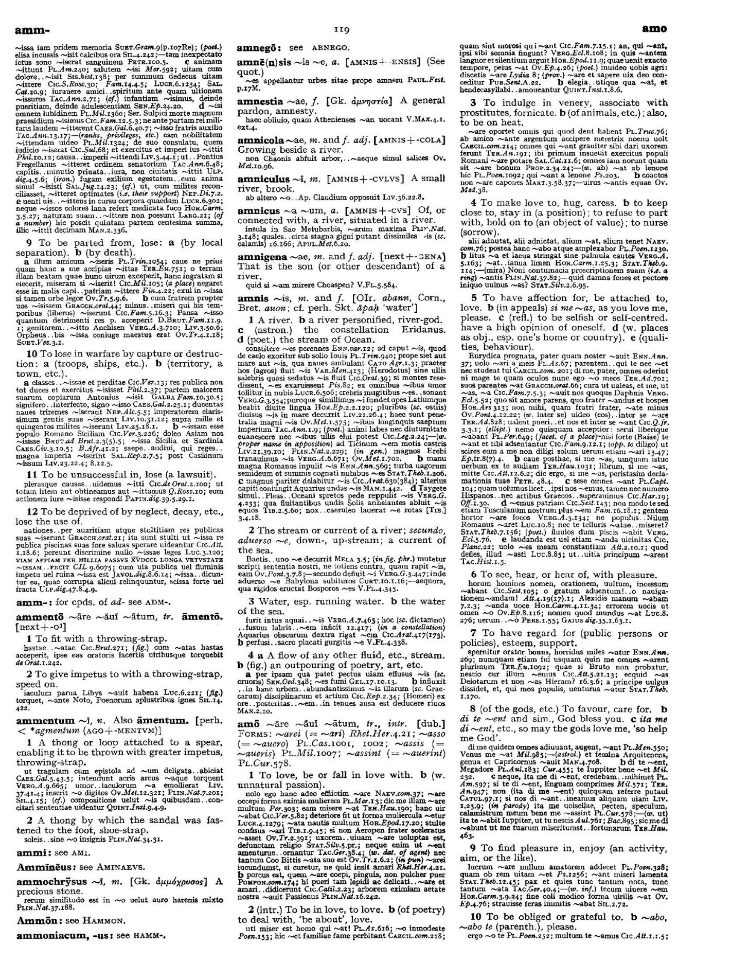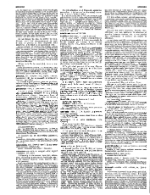
page_listing.tpl
page_subListingDetails.tpl
sub_listingDetails_style1.tpl
sub_listingDetails.title.tpl
amāre to love
amāre is a Latin Verb that primarily means to love.
Definitions for amāre
Wheelock's Latin
Verb
- 1
to love, like
English derivatives:
amorous amatory Amanda
Oxford Latin Dictionary
Verb
- 1
To love, be or fall in love with. (b) (w. unnatural passion),
- 2
(intr.) To be in love, to love. (b) (of poetry) to deal with, 'be about', love.
- 3
To indulge in venery, associate with prostitutes, fornicate. (b) (of animals, etc.); also, to be on heat.
- 4
To make love to, hug, caress. (b) to keep close to, stay in (a position); to refuse to part with, hold on to (an object of value); to nurse (sorrow).
- 5
To have affection for, be attached to, love. (b) (in appeals) si me ~as, as you love me, please. (c) (refl.) to be selfish or self-centred, have a high opinion of oneself. (d) (w. places as obj., esp. one's home or country). (e) (qualities, bahaviour).
Sentences with amāre
Latin to English
Aliquem dōna petentem nōn amō.Compare I do not like someone seeking gifts.
Tanta beneficia faciēbātis ut omnēs vōs amārent.Compare You (pl.) used to do such great kindnesses that all loved you.
Tam dūrus erat ut nēmō eum amāret.Compare He was so harsh that no one loved him.
Sī pecūniam amārēs, sapientiā carērēs.Compare If you were in love with money, you would lack wisdom.
Rōmae antiquae erant quī pecūniam plūs quam rem pūblicam amārent.Compare At ancient Rome there were those who loved money more than the state.
Et sumus et nos esse novimus et id esse et nosse diligimus.... Sine ullla phantasiarum vel phantasmatum imaginatione ludificatoria, mihi esse me, idque nosse et amare certissimum est. [De civitate dei, XI, 26]Compare We are, and we know that we are, and we love to be and to know that we are.... Without any illusion of image, fancy, or phantasm, I am certain that I am, that I know that I am, and that I love to be and to know. [Tr. Walsh, Zema, Monahan, and Honan]
Odi et amo. Quare id faciam, fortasse requiris. Nescio, sed fieri sentior et exrucior.Compare I hate and love. Why I do so, perhaps you ask. I know not, but I feel it, and I am in torment.
Id in primis cavere oportebit, ne studia, qui amare nondum potest, oderit et amaritudinem semel perceptum etiam ultra rudes annos reformidet. Lusus hic sit.Compare Above all things we must take care that the child, who is not yet old enough to love his studies, does not come to hate and dread the bitterness which he has once tasted, even when the years of infancy are left behind. His studies must be made an amusement.
Conjugation table for amāre
Cactus2000
| ACTIVE | |
| Indicative present | Indicative imperfect |
| amō amās amat amāmus amātis amant | amābam amābās amābat amābāmus amābātis amābant |
| Indicative perfect | Indicative pluperfect |
| amāvī amāvistī amāvit amāvimus amāvistis amāvērunt / amāvēre | amāveram amāverās amāverat amāverāmus amāverātis amāverant |
| Indicative future | Indicative future perfect |
| amābō amābis amābit amābimus amābitis amābunt | amāverō amāveris amāverit amāverimus amāveritis amāverint |
| Subjunctive present | Subjunctive imperfect |
| amem amēs amet amēmus amētis ament | amārem amārēs amāret amārēmus amārētis amārent |
| Subjunctive perfect | Subjunctive pluperfect |
| amāverim amāveris amāverit amāverimus amāveritis amāverint | amāvissem amāvissēs amāvisset amāvissēmus amāvissētis amāvissent |
Infinitive present amāre Infinitive perfect amāvisse Infinitive future amātūrum esse | Imperative present amā amāte Imperative future amātō amātō amātōte amantō |
| PASSIVE | |
| Indicative present | Indicative imperfect |
| amor amāris amātur amāmur amāminī amantur | amābar amābāris / amābāre amābātur amābāmur amābāminī amābantur |
| Indicative perfect | Indicative pluperfect |
| amātus sum amātus es amātus est amātī sumus amātī estis amātī sunt | amātus eram amātus erās amātus erat amātī erāmus amātī erātis amātī erant |
| Indicative future | Indicative future perfect |
| amābor amāberis / amābere amābitur amābimur amābiminī amābuntur | amātus erō amātus eris amātus erit amātī erimus amātī eritis amātī erunt |
| Subjunctive present | Subjunctive imperfect |
| amer amēris / amēre amētur amēmur amēminī amentur | amārer amārēris / amārēre amārētur amārēmur amārēminī amārentur |
| Subjunctive perfect | Subjunctive pluperfect |
| amātus sim amātus sīs amātus sit amātī sīmus amātī sītis amātī sint | amātus essem amātus essēs amātus esset amātī essēmus amātī essētis amātī essent |
Infinitive present amārī Infinitive perfect amātum esse Infinitive future amātum īrī | Imperative present amāre amāminī Imperative future amātor amātor - amāntor |
| PARTICIPLE | ||
| Participle present active | ||
| Nom. | amāns | amantēs |
| Gen. | amantis | amantium |
| Dat. | amantī | amantibus |
| Acc. | amantem | amantēs |
| Abl. | amante | amantibus |
| Participle future active | ||
| Nom. | amātūrus | amātūrī |
| Gen. | amātūrī | amātūrōrum |
| Dat. | amātūrō | amātūrīs |
| Acc. | amātūrum | amātūrōs |
| Abl. | amātūrō | amātūrīs |
| Participle perfect passive | ||
| Nom. | amātus | amātī |
| Gen. | amātī | amātōrum |
| Dat. | amātō | amātīs |
| Acc. | amātum | amātōs |
| Abl. | amātō | amātīs |
| Gerundive | ||
| Nom. | amandus | amandī |
| Gen. | amandī | amandōrum |
| Dat. | amandō | amandīs |
| Acc. | amandum | amandōs |
| Abl. | amandō | amandīs |
| Gerund | Supine | |
| Nom. | amāre | amātum |
| Gen. | amandī | amātū |
| Dat. | amandō | |
| Acc. | amandum | |
| Abl. | amandō | |
Data sources
Notes
- Definitions
- Frederick M. Wheelock, Wheelock's Latin, 6th ed., rev. Richard A. LaFleur (New York, NY: HarperCollins Publishers, 2005): 6.
- P. G. W. Glare, Oxford Latin Dictionary, Vols. 1-8 (Oxford: Clarendon Press, 1982): 119.
- Word frequencies
- Christopher Francese, "Latin Core Vocabulary," Dickinson College Commentaries, last modified 2014, http://dcc.dickinson.edu.
- Paul B. Diederich, The Frequency of Latin Words and Their Endings, PhD diss., (Columbia University, 1939).
- Louis Delatte, Suzanne Govaerts, Joseph Denooz, and Etienne Evrard, Dictionnaire fréquentiel et index inverse de la langue latine [Frequency Dictionary and Inverse Index of the Latin Language] (Liège, Belgium: Laboratoire d'analyse statistique des langues anciennes de l'Université de Liège [L.A.S.L.A.], 1981): 122.
Bibliography
Allen, Joseph H. Allen and Greenough's New Latin Grammar for Schools and Colleges: Founded on Comparative Grammar. Edited by James B. Greenough, George L. Kittredge, Albert A. Howard, and Benjamin L. D'Ooge. Boston, MA: Ginn & Company, 1903.
Crystal, David. A Dictionary of Linguistics and Phonetics. 6th ed. Oxford, UK: Blackwell Publishing, 2008.
Delatte, Louis, Suzanne Govaerts, Joseph Denooz, and Etienne Evrard. Dictionnaire fréquentiel et index inverse de la langue latine [Frequency Dictionary and Inverse Index of the Latin Language]. Liège, Belgium: Laboratoire d'analyse statistique des langues anciennes de l'Université de Liège (L.A.S.L.A.), 1981.
Diederich, Paul B. The Frequency of Latin Words and Their Endings. PhD diss., Columbia University, 1939.
Francese, Christopher. "Latin Core Vocabulary." Dickinson College Commentaries. Last modified 2014. http://dcc.dickinson.edu/latin-vocabulary-list.
Gildersleeve, Basil L., and Gonzales Lodge. Gildersleeve's Latin Grammar: Third Edition, Revised, and Enlarged. 3rd ed. London, England: Macmillan and Co., 1903.
Glare, Peter G.W. Oxford Latin Dictionary. Vols. 1-8. Oxford, England: Clarendon Press, 1982.
Krüger, Bernd. "Latin Conjugation Tables." Cactus2000. Accessed May 5, 2023. https://latin.cactus2000.de/index.en.php.
Pierson, Nick. "Sound of Text." Accessed October 26, 2019. https://soundoftext.com.
Wheelock, Frederick M. Wheelock's Latin. 6th ed. Revised by Richard A. LaFleur. New York, NY: HarperCollins Publishers, 2005.
Wiktionary Contributors. "Victionarium." Wikimedia Foundation, Inc. Updated March 18, 2019. https://la.wiktionary.org/wiki/Victionarium:Pagina_prima.
Citation
Chicago (17th ed.)
Allo Contributors. "amō, amāre, amāvī, amātum (v.) - Latin Word Definition." Allo Latin Dictionary. Last modified . Accessed February 20, 2026. http://ancientlanguages.org/latin/dictionary/amo-amare-amavi-amatum.
Entry created on . Last updated on .








